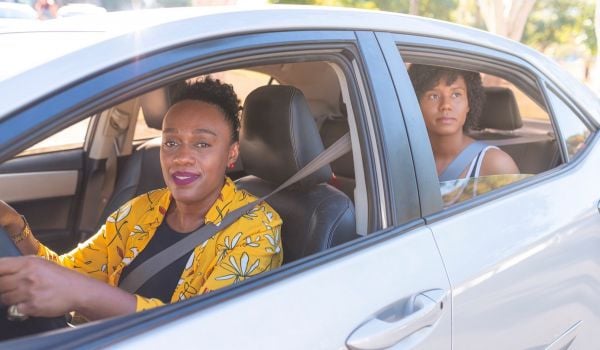One sign that Friday’s Seattle City Council meeting on ride-sharing services like UberX, Lyft, and Sidecar wasn’t going to be your dry legislative affair was when the sign language interpreter’s voice broke.
She was translating for “Ryan,” who spoke of his disgust with the service he and others in Seattle’s deaf and blind community got from the city’s cab drivers: rude, impersonal, patronizing. A friend suggested Uber. “They were courteous,” said Ryan, wearing a blue t-shirt with the slogan Uber Opens Doors, through the croaking ASL translator. “They were kind. And they gave me a sense of self-respect and self-esteem. It really changed my life.”
The Seattle City Council’s Committee on Taxi, For-Hire, and Limousine Regulations met Friday to talk about how to handle the emergence of ride-share in their city over the last few years, the latest meeting in a process has been going on for more than a year and isn’t quite over yet: the council won’t vote until the end of the month on its new rules. But the two-hour-plus session — attended by all nine members of the Seattle City Council — offered a long and deep look inside what local lawmakers are thinking about when they sit down and contemplate the future of ride-sharing.
Two main issues dominated the agenda Friday: insurance, as in whose covers which aspects of the work of so-called Transportation Network Companies, or TNCs; and caps, as in the limits on how many and low long ride-share cars can be on the Seattle’s road. The Committee was largely on board the sort of $1,000,000-worth of liability insurance proposed by the recently-launched P2P Rideshare Insurance Coalition, spearheaded by Lyft. But the far stickier question is about when that insurance applies.
The TNCs, for their part, have backed the idea that they’re liable only when drivers are explicitly using their apps to ferry a paying fare. “Commercial mode,” they call it. But where does that leave the family of Sofia Liu, the six-year-old killed in a crash in San Francisco on New Year’s Eve while, by some accounts, the involved driver was in between rides? The girl’s case has become a talking point in the broader ride-share debate; during Friday’s open mic portion, a cabbie held up a photo of Liu and said with little other explanation, “The UberX did this.” In a move that will irk the TNCs, the Seattle councilmembers seemed more amenable to a ‘log-in-to-log-out’ model, where company insurance kicks in as soon as a driver fires up the Uber or Lyft or Sidecar app and stays in effect until he or she logs off for the day.
But the committee had more trouble figuring out how to limit who can drive ride-share, if indeed they should restrict such a thing at all. In past meetings, the committee had been entertaining a “two-tier system,” where ride-share drivers would be burdened with only the loosest of rules but allowed out on the roads for just 16 hours a week. The flaw with that so-called “casual driver” approach, a council policy staffer explained, was that, “Nobody seemed, at the end of the day, to like it.” In a move sure to displease the TNCs, the committee moved instead to a model where ride-share drivers would go through the same training as cabbies — in Seattle, two-days worth of instruction.
Council President and committee chair Sally J. Clark summed up the policy: “You can drive as much as you want, as long as you have the license.”
Then there was perhaps the toughest question of all: whether there should be a cap on the total number of drivers, and what it might be. There were those who argued restricting the pool of ride-share drivers is needed to protect the livelihoods of existing drivers, many of whom are immigrants or are otherwise using the job to get a toehold in the United States. But others saw things in nearly the opposite. “I don’t want us to get stuck on artificial limits,” said Councilmember Sally Bagshaw. “We need, simply, more options,” she said to loud applause. “And really, this is the real social justice.”
One additional hitch is that, by general admission, the target number of ride-share licenses the council is considering — 300 — was largely plucked from thin air. The council grumbled that while Uber in particular as willing to spread around data showing by percentages that its fleet of Seattle drivers was just as diverse as the city’s existing cabbie brigade, it somehow found it impossible to tell the committee a tally of the total number of drivers it currently has in the city. “Frankly,” said Bagshaw, looking out into the crowd where company reps sat, “I feel like we’ve had to scold you to get as much as we’ve gotten.”
As much as Friday’s session was about nitty-gritty rulemaking by a Seattle city council that is quite clearly willing to regulate ride-share, there are still unsettled existential questions still in the air there. “Fair competition” is the standard the committee has held out for itself. But what’s fair?
Uber in particular tells the story of itself as the little-guy company going up against the big, bad, corrupt taxi industry. That’s absurd, said Councilmember Kshama Sawant, the council’s lone socialist. “The ride share companies are being underwritten by Goldman Sachs and Jeff Bezos and so on,” said Sawant, to huge and sustained applause. (The bank and Amazon founder were early funders of Uber.) How can small companies and individual cabbies be expected to compete with that?
Or as one such driver put it in his testimony, “Corporate America wants their way with no cost. Corporate America don’t want to play by the playbook.”
But what has, fascinatingly, also increasingly becoming clear in Seattle is that the existence of companies like Uber is causing regulators not just to consider adding a chapter to cover ride-share, but to reconsider how well the whole playbook is written. Take quality checks on the cab experience. The existing way is centralized: people complain to the city about rude cabbies, subpar cabs, dispatchers who left them hanging. What people seem to truly love about ride-share, said Councilmember Tom Rasmussen, is the feedback loop baked into the app-driven model, wherein riders rate their experiences for all to see. Should cabbies be called on to do the same thing? “Self-policing,” mused Rasmussen, “may be the model that might work better than a city being a mediator.”
And then there’s the data on serving Seattle’s rougher or less desirable neighborhoods that the committee is leaning on the TNCs to share. Shouldn’t cab companies be expected to share the same insight into their operations? “Fair,” said Bagshaw, “is fair.”
Seattle is hardly alone in wrestling with how to integrate ride-share into its city. Cabbies in Chicago recently sued over what they see as city’s preferential treatment of ride-share. Pennsylvania regulators are said to be eyeing Lyft’s arrival in Pittsburgh. But Seattle is being notably thorough and public about working through the process, and, what’s more, liberal Seattle (and its well-paid, full time council) is, more than other places, willing to entertain the idea that what’s at stake is about far more than cab rides.
Closing out Friday’s session, Councilmember Mike O’Brien said that he’s gotten letters of support for ride-share from local hotel and restaurant associations, arguing to “preserve the innovation that’s happening,” especially by uncapping the number of possible TNC drivers.
O’Brien found that curious. Will the hoteliers, he wondered, be okay with letting Airbnb operate in Seattle without rules? Would the restaurateurs be open to doing away with city rules that limit how close to eateries food trucks can set up shop?
If not, then why, asked O’Brien, the unquestioning backing of ride-share companies’ freedom to operate? Is it just because in the last few years they’ve spent operating quasi-legally in the city they’ve built up a fervent fan base? Or is something more nefarious at work? If we’re saying that ride-share is an exception, said O’Brien, “and it just happens to be an instance where the people we’re directly affecting are low-income people, people of color, immigrants and refugees, then I don’t see how we can support this without violating and undermining all of the work we do on race and social justice.”
With that, committee chair Sally Clark commended her colleagues on having “narrowed the universe” of what the committee will consider on voting day, the 27th of February, and drew the meeting to a close.

Nancy Scola is a Washington, DC-based journalist whose work tends to focus on the intersections of technology, politics, and public policy. Shortly after returning from Havana she started as a tech reporter at POLITICO.
















